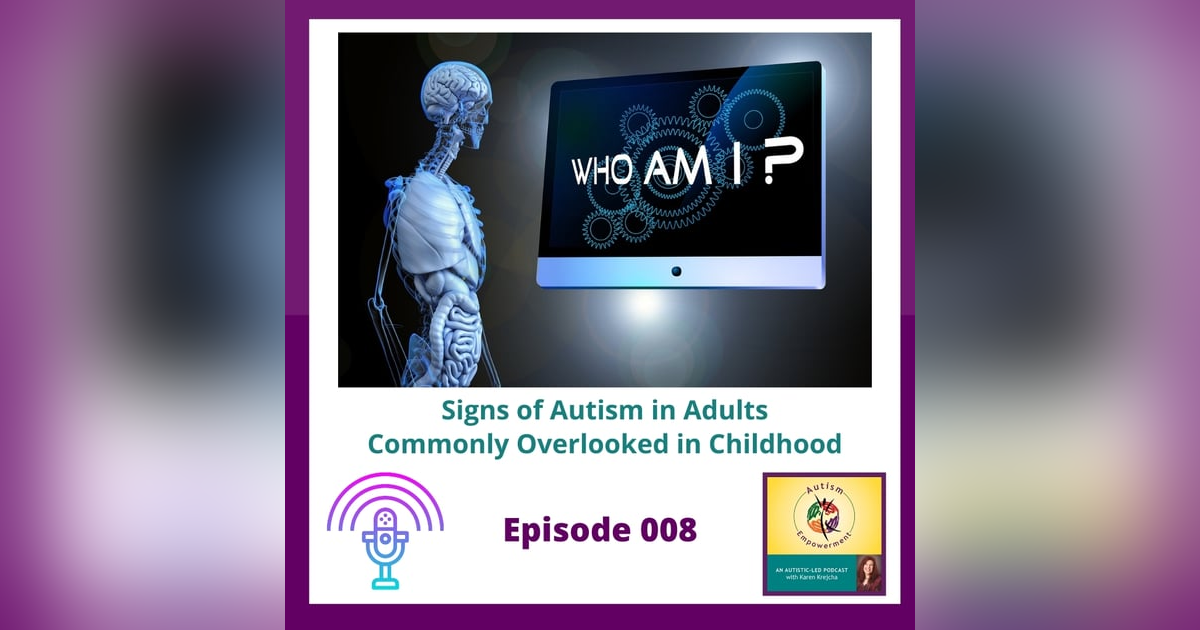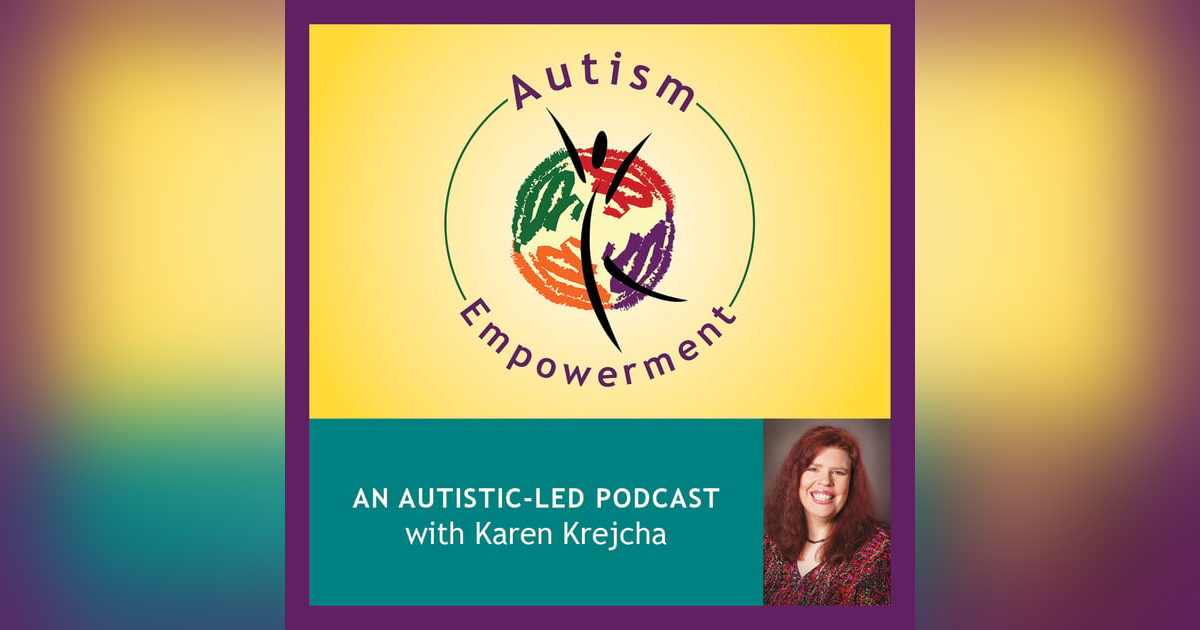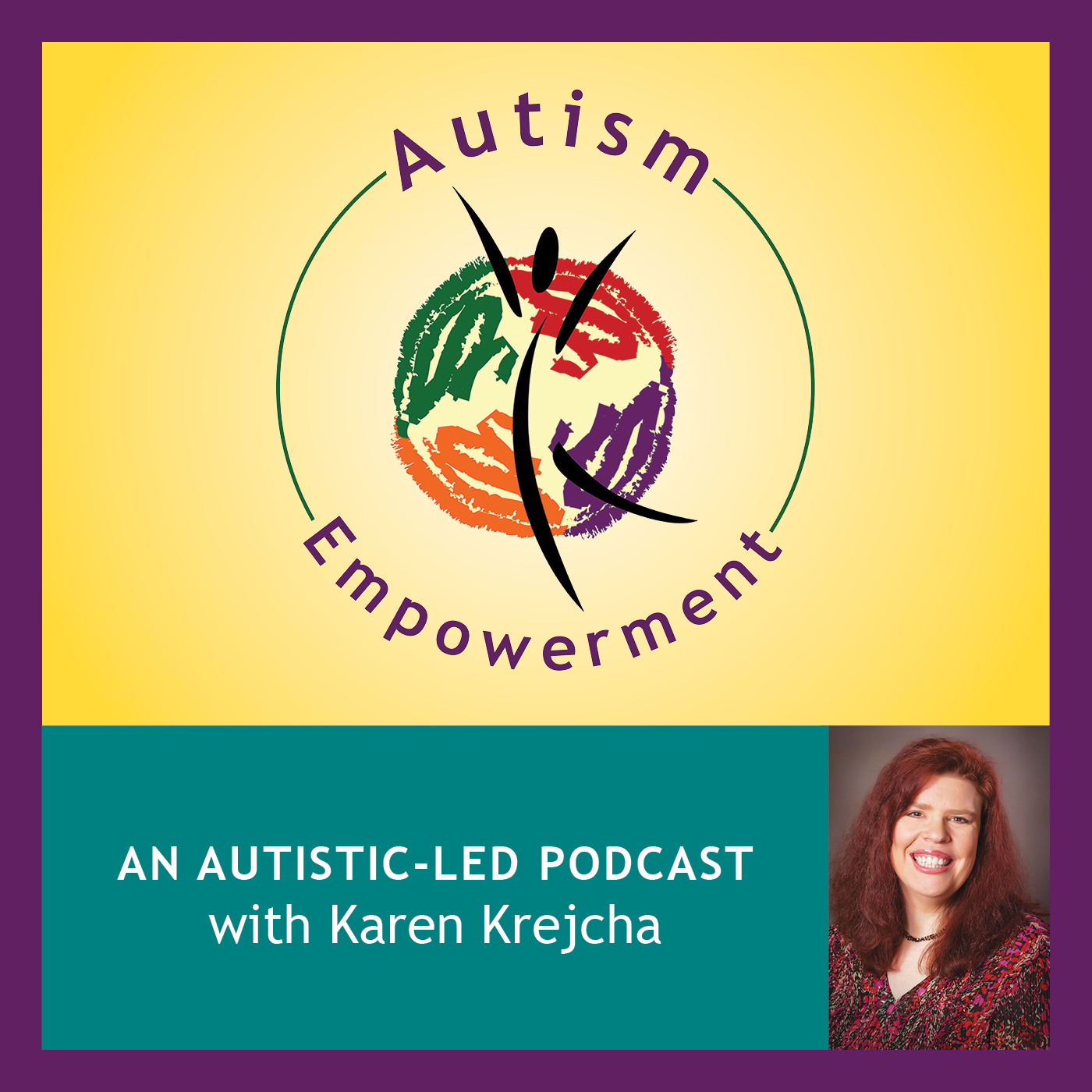Ep. 8: Signs of Autism in Adults Commonly Overlooked in Childhood


In today’s episode, Karen Krejcha, co-founder of Autism Empowerment and an autistic adult, will be talking with John Krejcha about commonly overlooked Signs of Autism in Adults and why so many people in their 30’s to 60’s and older don’t get identified or diagnosed until later in adulthood. If you are asking yourself if you or an adult family member or friend may be autistic and what to do next, please listen to today’s show.
Episode Summary:
In today’s episode, Karen Krejcha, co-founder of Autism Empowerment and an autistic adult, will be talking with John Krejcha about commonly overlooked Signs of Autism in Adults and why so many people in their 30’s to 60’s and older don’t get identified or diagnosed until later in adulthood. It is estimated that over 2% of adults in the United States are on the autism spectrum. If you are asking yourself if you or an adult family member or friend may be autistic and what to do next, please listen to today’s show.
Topics Discussed in this episode with approximate times:
- Why are we going over this today? (1:56)
- Brief History of Autism (3:22)
- History of Autism in the Diagnostic and Statistical Manual (DSM III, IV & V)
- Diagnostic Criteria for Autism today (7:22)
- Social Signs and Interactions that may have been missed (10:12)
- Relating to other people and fitting in.
- Tendency toward literal thinking (10:54)
- Black and white thinking / Splitting (11:28)
- Becoming other people, mimicking accents and mannerisms, theater (12:25)
- Rehearsing conversations, compulsion, control (13:08)
- Replaying old conversations (14:11)
- Making and keeping friendships (14:45)
- Other people breaking rules (15:34)
- Verbal and Nonverbal Communication (16:02)
- Sensory input, overload, missing body language clues
- Dislike of small talk, preference for meaningful conversation
- Difficulty focusing on conversation in group gatherings (17:04)
- Face-blindness or difficulty recognizing familiar faces (19:15)
- Jokes, sarcasm, idioms, metaphors (19:47)
- Reading people through thinking in patterns (20:34)
- Hidden curriculum (21:18)
- Dislike of talking on the phone and preferring email or text (23:09)
- Repetitive and Ritualistic Behaviors that may have been missed (25:47)
- Routines
- Coping Mechanisms (Self-regulation, stimming) (28:41)
- Self-harm and unhealthy coping mechanisms (29:44)
- Organization / Executive Functioning (30:15)
- Special Interests & Passions (31:33)
- Sensory and Physical Signs (33:44)
- Red flags with eating disorders: anorexia, bulimia, compulsive eating
- Sensory input - visual, auditory, smells, touching, sensory input
- Picky or selective eating as a child or an adult (34:55)
- Sensory Seekers and Sensory Avoiders (36:37)
- Clumsiness, challenges with fine or gross motor skills (37:43)
- Struggle with falling and staying asleep (make lists) (38:20)
- Next Steps: Seeking a Diagnosis (38:55)
- Therapy and Supports (41:00)
Resources mentioned in this episode:
- Autism Empowerment Podcast Episode 4: 9 Points to Ponder in Journey for Connection
- Autism Empowerment Podcast Episode 5: Support Groups and Forums - Part 2 - Priorities, Plans and Strategies for Success
- Spectrum Life Magazine
- WrongPlanet.net - Wrong Planet is an online community for individuals with Autism, Asperger’s Syndrome, ADHD, PDDs, and other neurological differences.
References from this episode
- A 2017 study from the Centers for Disease Control and Prevention (CDC) estimates the prevalence of autism spectrum disorder among adults 18 or older in the United States to be 2.21% or over 5.4 million people. There is not an existing surveillance system to collect this information so this study helped fill a gap.
- Aspie Quiz (Online test - The goal of this test is to check for neurodiverse / neurotypical traits in adults. The neurodiversity classification can be used to give a reliable indication of autism spectrum traits prior to eventual diagnosis.)
- AspieTests.org - This site hosts a collection of tests related to Autism and Asperger's syndrome.
- The Ritvo Autism Asperger Diagnostic Scale Revised (RAADS-R) - The RAADS-R is a modified version of the Ritvo Autism Asperger's Diagnostic Scale
Next steps:
- Please subscribe to our show, share with friends and family and leave us a positive review!
- Support our nonprofit work with a donation
- Like Autism Empowerment Podcast at Facebook
- Like Autism Empowerment at Facebook
- Like Spectrum Life Magazine at Facebook
- Follow us at Twitter @Podcast_Autism @AutismEmpowermt @SpectrumLifeMag
Full Transcript. Click below on words to play.
There may be slight errors due to the way artificial intelligence interprets our voices. We've done some light editing. We hope this accommodation will be useful to you. Downloads are also available for free.























